News & Events
Regaining consciousness of Africa’s intellectual futures
Leading local and international scholars, academics, renowned thinkers and commentators joined Unisa as it held a colloquium on “Reclaiming Africa’s Intellectual Futures” on 03 September 2021. The colloquium was held on the occasion of the inauguration and investiture of Professor Puleng LenkaBula, the first black woman to be appointed as the Principal and Vice-Chancellor (VC) of the leading African university in its 148 years of existence.
Watch a recording of the event here.
The herstorical/historical event was divided into three sessions during which the speakers unpacked the theme in different contexts.
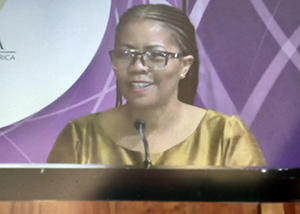
Professor Puleng LenkaBula
On behalf of the Unisa Council, Professor Rocky Ralebipi-Simela welcomed everyone and gave an overview of the event. She said: “This colloquium seeks to provide space for ideas, ideation, contestations and debates in the scholars’ commitment to shaping constructive and affirming African intellectual futures.” She added: “We invite debates and papers that will speak to questions such as how Unisa is engaged in the Africa we want and what critical role African intellectuals play in the higher education sector in the 21st century.”
The keynote speaker and the woman of the moment, Professor Puleng LenkaBula, expressed her appreciation of the honour to be given the opportunity to celebrate her inauguration and investiture in her new role. She said: “As I rise to the occasion, I pledge my commitment that together we must pursue and seek to change the ecosystem of Unisa. We must reclaim Africa’s futures in a knowledge-based economy in support of my vision of an inclusive, yet depatriarchalised, deracialised and decolonised university.”
Speaking on the impact that universities should have on societies, the VC remarked: “The sky is no longer the limit, but a contestation for research. The Department of Higher Education, Science and Technology has invested in the Square Kilometre Array project. Unisa and other universities should take advantage of science platforms and systems that enable us to enrich our research. We need to be inventors instead of consumers of the fourth industrial revolution.”
She said: “As African leaders in the higher education sector,” she continued, “there is a need to embrace leadership as a planetary and pluriversality consciousness that looks to attain the developmental targets of our continent, the Africa we want and our own national development plan with clear dedication to continental solidarity, global justice and radically humanising approaches.”
Universities should be connected to societies
As he congratulated LenkaBula, Professor of Theology of the University of Pretoria, Tinyiko Maluleke, also lauded the brilliance of theme. He stated: “It suggests that the African future is not what it used to be and that we are capable of shaping the future of Africa differently.” According to Maluleke, Africa has been a victim of three crimes: being portrayed as a continent without a history, being portrayed as a continent without a future, and the continuing doubt about the humanity of Africans, especially African women. “As African universities, we need to find a way to get out of the colonial or post-colonial project,” he concluded.
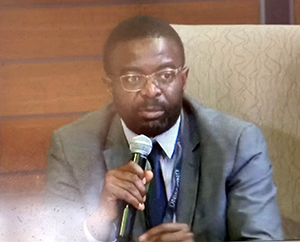
Professor Colin Chasi
Professor Colin Chasi, Director, Unit for Institutional Change and Social Justice at the University of the Free State, affirmed: “It is time to reclaim our roots. We are dislocated and disconnected from our real concerns, marginalised from things that matter to us and disalienated from our realities and basic needs. Our universities are disconnected from the societies that they must serve.” Chasi maintained that in reclaiming Africa’s intellectual heritage, pasts and traditions, all memories contribute.
Professor Neil Fassina, President: International Council for Open and Distance Education, lauded Unisa for its incredibly rich history of distance education. Explaining how important digitally enabled education is, he said: “The role of digital education enables the breakdown of systematic barriers that stand between a person and their potential future.” He urged universities to embrace digital technologies to open more opportunities and realities.
Adding to the conversation, Professor Adebayo Olukoshi, Director for Africa and West Asia: International Institute for Democracy and Electoral Assistance, praised older generations of African scholars who tried to retrieve African history and rebuild its humanity and dignity. “If we can nurture a generation of African scholars that is invested in understanding the world around us, that will enrich our capacity to take on the world and reclaim our future,” he said.
Social death unacceptable
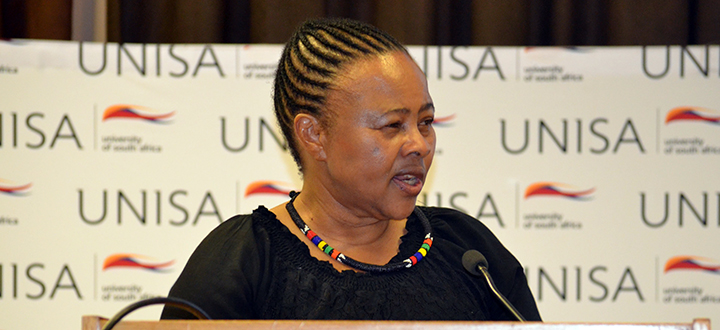
Professor Nthabiseng Motsemme
Professor Nthabiseng Motsemme of the University of Johannesburg paid tribute to, among others, African maternal ancestors and first women leaders who represent the spirit of courage and humanity in leadership. She spoke firmly against social death in higher education, which includes racial and sexist exclusions. She proposed a womanist ‘ubuntu’ intersectionalist approach to ensure sustainable transformation in institutions.
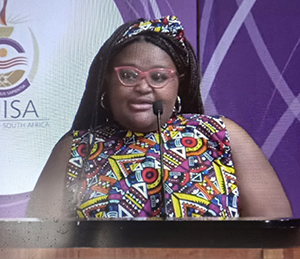
Malaika wa Azania
Dr Phil Mjwara, Director-General: Department of Science and Innovation, spoke on what his department is doing to identify and attempt to solve the problems of knowledge gaps in relation to indigenous knowledge systems and COVID-19. He remarked: “When we talk of reclaiming African intellectual futures, we need to have a clear sense of what exactly needs to be reclaimed.”
Writer, political commentator and columnist Malaika Mahlatsi, popularly known as Malaika wa Azania, reflected on the #FeesMustFall movement that she was part of, and clarified that beyond ensuring access to higher education for black historically disadvantaged students, it made other important demands such as spatial justice and the decolonisation of academia and the curriculum. She lauded the VC for her profound humanising approach to students who were rejected at universities by giving them hope for the future.
Professor Saeed Bakri Osman, President: Association of African Universities and President: Sudan International University, explained how the implementation of the African Union’s (AU’s) strategic plan would require political will. “It would ensure that higher education contributes to sustainable development goals and the AU’s agenda 2063 on the Africa we want,” he said.
Resuscitating hope in the education space
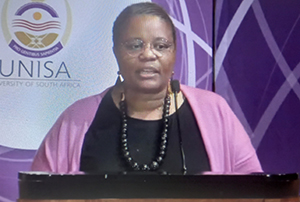
Professor Grace Khunou
Unisa’s Professor Grace Khunou, Acting Director of Communication, Marketing and Events, explained that while Unisa should remain competitive, humanity and compassion should drive service delivery to students and the work that it does as the biggest university in the continent. “In our efforts of being inclusive, it is important to create an environment for futuristic thinking for those who are hopeless about the future in the education space,” she said.
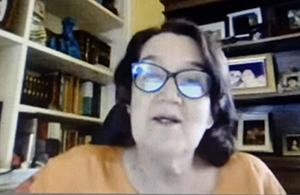
Professor Isabel Maria Casimiro
Unisa’s Professor Monde Ntwasa, Acting Executive Dean: College of Agriculture and Environmental Sciences, reflected on how Africa experienced dehumanity and is dispossessed of its people. He said: “An investment in human development is the ultimate wisdom for any country.” He urged Africa to invest in research and development so that there can be an African perspective in the research agenda.
Professor Isabel Maria Casimiro, President: Council for the Development of Social Sciences Research in Africa, advised: “Disappointment is part of our journey towards engendering higher education curricula, institutions and academics. It is part of a long journey to decolonise and depatriarchalise our higher education institutions in the African continent. Let us transform our universities to contribute to the transformation of our societies.”
Each session had open discussions where the keynote speaker (VC) and presenters responded to the audience’s questions and comments around, among others, what constitutes western knowledge, if Unisa has a plan to influence the content of history in education, and the link between technology and education.
In her vote of thanks, Unisa’s Professor Edith Phaswana, Head of Academic Programmes: Thabo Mbeki African School of Public and International Affairs, applauded the insightful engagements. She closed: “The theme will enable Unisa to reflect and achieve its potential. We should be conscious of our present as we reclaim our intellectual futures.”
*By Nancy Legodi, Acting Journalist, Department of Institutional Advancement
Publish date: 2021/09/06
